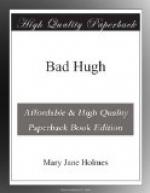The remark jarred painfully on Irving’s finer feelings, while the doctor, affecting to laugh and ejaculate “pretty good,” wished so much that his black-eyed lady were different in some things.
CHAPTER XVII
HUGH
An unexpected turn in Hugh’s affairs made it no longer necessary for him to remain in the sultry climate of New Orleans, and just one week from his mother’s departure from Spring Bank he reached it, expressing unbounded surprise when he heard from Aunt Eunice where his mother had gone, and how she had gone.
“Fool and his money soon parted,” Hugh said. “I can fancy just the dash Ad is making. But who sent the money?”
“A Mrs. Johnson, an old friend of your mother’s,” Aunt Eunice replied, while Hugh looked up quickly, wondering why the Johnsons should be so continually thrust upon him, when the only Johnson for whom he cared was dead years ago.
“And the young lady—what about her?” he asked, while Aunt Eunice told him the little she knew, which was that Mrs. Johnson wished her daughter to come to Spring Bank, but she did not know what they had concluded upon.
“That she should not come, of course,” Hugh said. “They had no right to give her a home without my consent, and I’ve plenty of young ladies at Spring Bank now. Oh, it was such a relief when I was gone to know that in all New Orleans there was not a single hoop annoyed on my account. I had a glorious time doing as I pleased.”
“And yet you’ve improved, seems to me,” Aunt Eunice said.
“Oh, I’ll turn out a polished dandy by and by, who knows?” Hugh answered, laughingly; then helping his aunt to mount the horse which had brought her to Spring Bank, he returned to the house, which seemed rather lonely, notwithstanding that he had so often wished he could once more be alone, just as he was before his mother came.
On the whole, however, he enjoyed his freedom from restraint, and very rapidly fell back into his old loose way of living, bringing his dogs even into the parlor, and making it a repository for both his hunting and fishing apparatus.
“It’s splendid to do as I’m mind to,” he said, one hot August morning, nearly three weeks after his mother’s departure.
“Hello, Mug, what do you want?” he asked, as a very bright-looking little mulatto girl appeared in the door.
“Claib done buyed you this yer,” and the child handed him the letter from his mother.
The first of it was full of affection for her boy, and Hugh felt his heart growing very tender as he read, but when he reached the point where poor, timid Mrs. Worthington tried to explain about Alice, making a wretched bungle, and showing plainly how much she was swayed by ’Lina, it began to harden at once.
“What the plague!” he exclaimed as he read on. “Suppose I remember having heard her speak of her old school friend, Alice Morton? I don’t remember any such thing. Her daughter’s name’s Alice—Alice Johnson,” and Hugh for an instant turned white, so powerfully that name always affected him.




